Related Research Articles

Cameroon's noncontentious, low-profile approach to foreign relations puts it squarely in the middle of other African and developing country states on major issues. It supports the principles of non-interference in the affairs of third world countries and increased assistance to underdeveloped countries. Cameroon is an active participant in the United Nations, where its voting record demonstrates its commitment to causes that include international peacekeeping, the rule of law, environmental protection, and Third World economic development. In the UN and other human rights fora, Cameroon's non-confrontational approach has generally led it to avoid criticizing other countries.

The foreign relations of Ghana are controlled by the Ministry of Foreign Affairs of Ghana. Ghana is active in the United Nations and many of its specialised agencies, the World Trade Organization, the Non-Aligned Movement, the Organisation of African Unity (OAU), the African Union (AU) and the Economic Community of West African States. Ghana generally follows the consensus of the Non-aligned Movement and the OAU on economic and political issues not directly affecting its own interests. Ghana has been extremely active in international peacekeeping activities under UN auspices in Lebanon, Afghanistan, Rwanda, and the Balkans, in addition to an eight-year sub-regional initiative with its ECOWAS partners to develop and then enforce a cease-fire in Liberia. Ghana is also a member of the International Criminal Court.

Since independence, with Jaja Wachuku as the first Minister for Foreign Affairs and Commonwealth Relations, later called External Affairs, Nigerian foreign policy has been characterised by a focus on Africa as a regional power and by attachment to several fundamental principles: African unity and independence; capability to exercise hegemonic influence in the region: peaceful settlement of disputes; non-alignment and non-intentional interference in the internal affairs of other nations; and regional economic cooperation and development. In carrying out these principles, Nigeria participates in the African Union, the Economic Community of West African States (ECOWAS), the Non-Aligned Movement, the Commonwealth of Nations, and the United Nations.

Tanzania's first president, Julius Nyerere also was one of the founding members of the Non-Aligned Movement, and, during the Cold War era, Tanzania played an important role in regional and international organisations, such as the Non-Aligned Movement, the front-line states, the G-77, and the Organisation of African Unity (OAU). One of Africa's best-known elder statesmen, Nyerere was personally active in many of these organisations, and served chairman of the OAU (1984–85) and chairman of six front-line states concerned with eliminating apartheid in Southern Africa. Nyerere was also involved with peace negotiations in Burundi until his death. Nyerere's death, on 14 October 1999, is still commemorated annually.

After independence in 1964 the foreign relations of Zambia were mostly focused on supporting liberation movements in other countries in Southern Africa, such as the African National Congress and SWAPO. During the Cold War Zambia was a member of the Non-Aligned Movement.
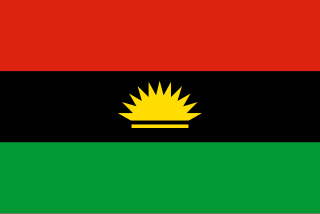
Biafra, officially the Republic of Biafra, was a partially recognised country in West Africa that declared independence from Nigeria and existed from 1967 until 1970. Its territory consisted of the former Eastern Region of Nigeria, predominantly inhabited by the Igbo ethnic group. Biafra was established on 30 May 1967 by Igbo military officer and Eastern Region governor C. Odumegwu Ojukwu under his presidency, following a series of ethnic tensions and military coups after Nigerian independence in 1960 that culminated in the 1966 anti-Igbo pogrom. The Nigerian military proceeded to attempt to reclaim the territory of Biafra, resulting in the start of the Nigerian Civil War. Biafra was formally recognised by Gabon, Haiti, Ivory Coast, Tanzania, and Zambia while receiving de facto recognition and significant military support from France. After nearly three years of war, during which around two million Biafran civilians died, President Ojukwu fled to Ivory Coast in exile as the Nigerian military was approaching the capital of Biafra. Philip Effiong became the second president of Biafra, and he oversaw the surrender of Biafran forces to Nigeria.
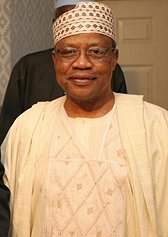
Ibrahim Badamasi Babangida is a Nigerian retired general and statesman who served as military president of Nigeria from 1985 until his resignation in 1993. He rose through the ranks to serve from 1984 to 1985 as Chief of Army Staff; going on to orchestrate his seizure of power in a coup d'état against Muhammadu Buhari.
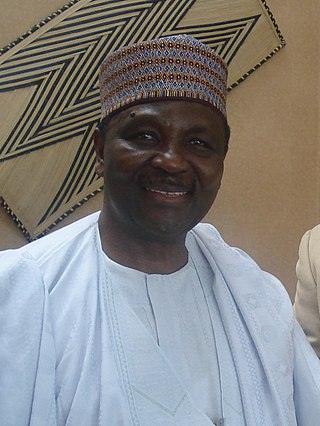
Yakubu Dan-Yumma "Jack" Gowon is a retired Nigerian army general and military leader. As head of state of Nigeria, Gowon presided over a controversial Nigerian Civil War and delivered the famous "no victor, no vanquished" speech at the war's end to promote healing and reconciliation. The Nigerian Civil War is listed as one of the deadliest in modern history, with some accusing Gowon of crimes against humanity and genocide. Gowon maintains that he committed no wrongdoing during the war and that his leadership saved the country.

The Nigerian Civil War, also known as the Nigerian–Biafran War or the Biafran War, was a civil war fought between Nigeria and the Republic of Biafra, a secessionist state which had declared its independence from Nigeria in 1967. Nigeria was led by General Yakubu Gowon, while Biafra was led by Lieutenant Colonel Chukwuemeka "Emeka" Odumegwu Ojukwu. Biafra represented the nationalist aspirations of the Igbo ethnic group, whose leadership felt they could no longer coexist with the federal government dominated by the interests of the Muslim Hausa-Fulanis of Northern Nigeria. The conflict resulted from political, economic, ethnic, cultural and religious tensions which preceded the United Kingdom's formal decolonisation of Nigeria from 1960 to 1963. Immediate causes of the war in 1966 included a military coup, a counter-coup, and anti-Igbo pogroms in Northern Nigeria.
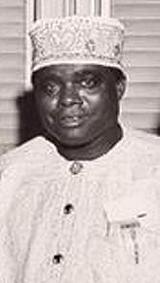
Jaja Anucha Ndubuisi Wachuku was a Pan-Africanist and a Nigerian statesman, lawyer, politician, diplomat and humanitarian. He was the first Speaker of the Nigerian House of Representatives; as well as the first Nigerian Ambassador and Permanent Representative to the United Nations. Also, Wachuku was the first Nigerian Minister for Foreign Affairs. Notably, Wachuku was a Royal Prince of Ngwaland, "descendant of 20 generations of African chiefs in the Igbo country of Eastern Nigeria".
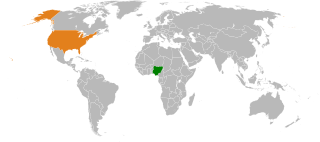
Bilateral relations between the Federal Republic of Nigeria and the United States of America were formally inaugurated when Nigeria attained its independence from Britain in 1960. In the 21st century, they have entailed an important, if occasionally uneasy, alliance, following a more chequered diplomatic past. Nigeria has traditionally been among the United States's most important partners in Africa, and together the countries' populations account for more than half a billion people.
Emmanuel Arinze Ifeajuna was a Nigerian army major and high jumper. He was the first Black African to win a gold medal at an international sports event when he won at the 1954 British Empire and Commonwealth Games. His winning mark and personal best of 6 ft 8 in (2.03 m) was a game record and a British Empire record at the time.

The Indigenous People of Biafra (IPOB) is a separatist group in Nigeria that aims to restore the defunct Republic of Biafra, a country which seceded from Nigeria prior to the Nigerian Civil War (1967–1970). Since 2021, IPOB and other Biafran separatist groups have been fighting a low-level guerilla conflict in southeastern Nigeria against the Nigerian government. The group was founded in 2012 by Nnamdi Kanu and Uche Mefor. Kanu is known as a British Nigerian political activist known for his advocacy of the contemporary Biafran independence movement. It was deemed a terrorist organization by the Nigerian government in 2017 under the Nigerian Terrorism Act. As of May 2022, the United Kingdom started denying asylum to members of IPOB who engaged in human rights abuses, though the U.K. government clarified that IPOB had not been designated as a terrorist organisation.

Igbo nationalism is a range of ethnic nationalist ideologies relating to the Igbo people of southeastern Nigeria. While the term is defined as seeking Igbo self-determination by some, others argue that it refers to the preservation and revival of Igbo culture and, for others, the development of Igboland stemming from the philosophy, Aku luo uno, which means "wealth builds the home".
Anthony Seibu Alec Abban was a Ghanaian teacher and politician. He was member of parliament in the first republic. He first served as a member of parliament for Ajumako-Asikuma electoral district from 1954 to 1965. In 1965 the constituency was split and he served as the member of parliament representing the Ajumako electoral area. He was also deputy minister in various portfolios in the first republic. In the third republic, he was a member of the People's National Party, the party that won the 1979 general election. Abban was a trained teacher. Prior to politics, he taught in various schools in the then Gold Coast.
John Young Ghann was a Ghanaian politician. He served as the Minister for Rural Industries in 1965 and the Minister for Internal Trade from 1965 to 1966. He also served as the member of parliament for the Adansi-Banka constituency from 1954 to 1965 and the member of parliament for the Adansi constituency from 1965 to 1966.
Ibrahim Tako or Galadiman Bida (1916–1978) was a Nigeria politician, teacher former federal minister for state and acting Minister of Defence in 1969.
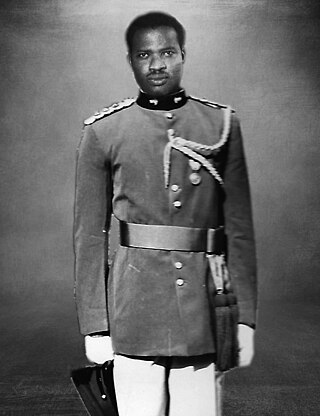
Ejike Ebenezer Obumneme Aghanya was a military officer and electrical engineer who served in the Nigerian Army and the Biafran Armed Forces, retiring as a colonel. Accused of involvement in the 1966 Nigerian coup d'état he was arrested and imprisoned without trial until the outbreak of the Nigerian Civil War where he served on the side of Biafra, holding key positions in the Biafran Armed Forces. He was the head of the Biafran Agency for Research and Production (RAP) which produced bombs, rockets, missiles, as well as ammunition, armored vehicles, telecommunication gadgets and petroleum refineries among others for the Biafran Armed Forces. Later he was the Chief of Staff of the Biafran Organisation of Freedom Fighters (BOFF) which was the guerrilla warfare and special operations arm of the Biafran Armed Forces. He also served as Battalion Commander, 44th Electrical and Mechanical Engineer Battalion Biafran Army and later Brigade Commander of the 58th Brigade of 12th Infantry Division Biafran Army during the war.
NNS Obuma, formerly NNS Nigeria, was a Nigerian frigate which served as the flagship of the Nigerian Navy from 1965 to 1982. It is presently a hulk stationed at the Nigerian Navy College of Engineering.
Sir Benedict Obidinma Odinamadu was a civil servant. He was the private Secretary to Dr. Nnamdi Azikiwe., Dr. M.I. Okpara while Premiers of Eastern Region of Nigeria respectively and First Secretary to the Military Government of Colonel Emeka Odumegwu Ojukwu.
References
- ↑ Agency, United States Central Intelligence (January 1965). Daily Report, Foreign Radio Broadcasts.
- ↑ Agency, United States Central Intelligence (September 1965). Daily Report, Foreign Radio Broadcasts.
- ↑ Lynch H.R. (2012) The Civil War. In: K. O. Mbadiwe. Palgrave Macmillan, New York. doi : 10.1057/9781137002624_10
- ↑ "NIGERIA-POLITICS: Too Hot To Handle For The Media | Inter Press Service". www.ipsnews.net. Retrieved 2020-08-15.